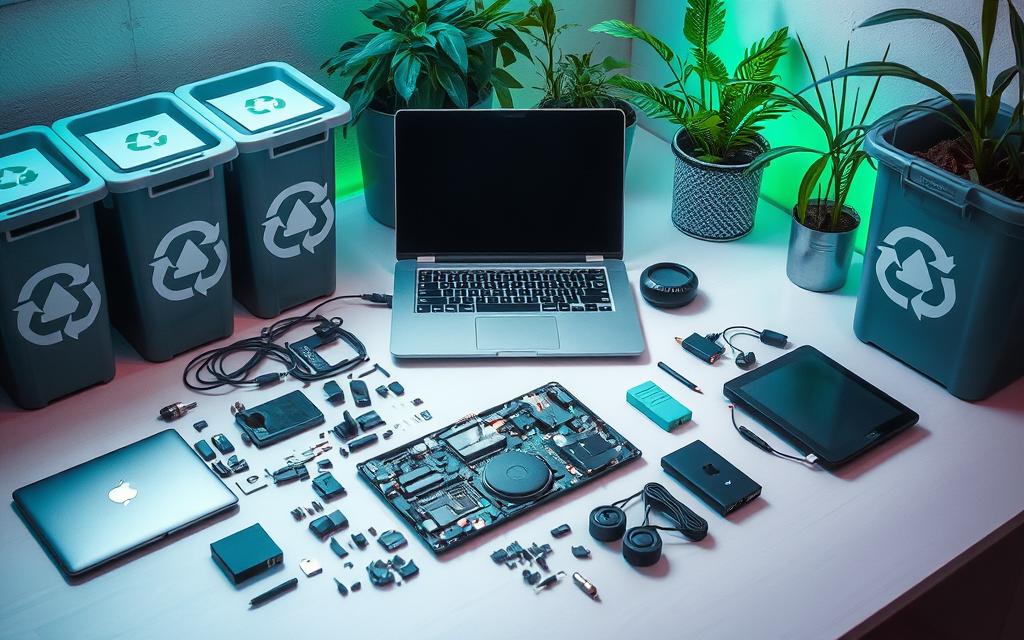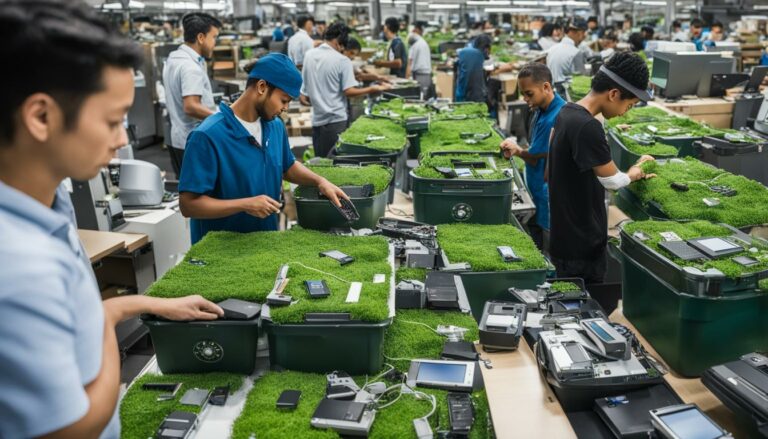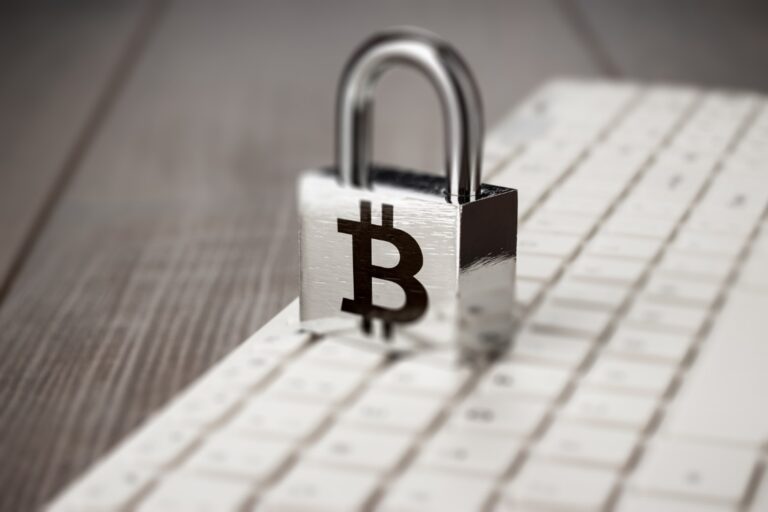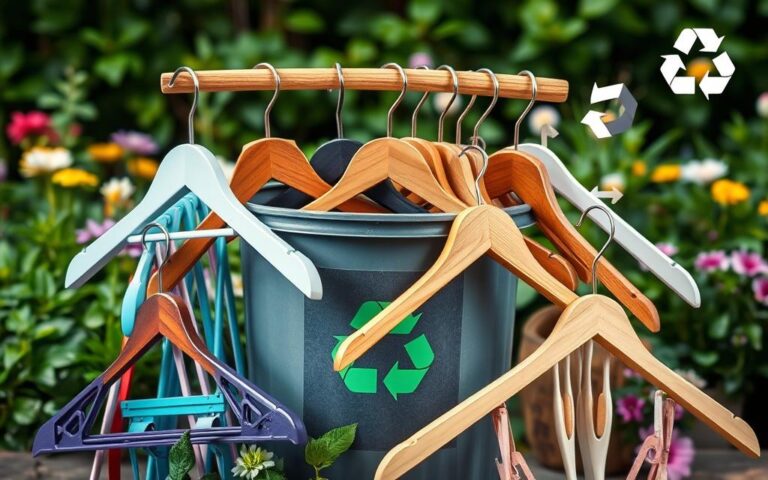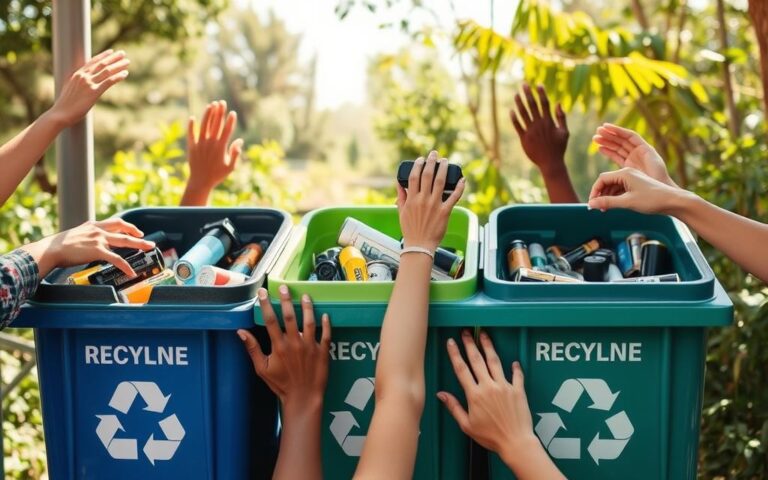How to Recycle Laptops Safely: Data Protection Tips
Recycling laptops is vital for keeping our planet clean and for protecting personal and business information. It’s worrying to know that 11% of hard drives might still have data on them if thrown away carelessly. This makes it super important to know how to get rid of old electronics the right way.
Did you know recycling a million laptops can save as much energy as 3,500 U.S. homes use in a year? This shows how recycling laptops can help the environment. But, throwing them out the wrong way can harm both our planet and people in poorer countries. These people might try to get useful parts from thrown-away electronics.
This start will show you how to safely erase your data and recycle your gadgets in an eco-friendly way. By choosing trusted recycling firms like ProTek Recycling, which follows strict rules, you can make sure your old electronics are dealt with safely. This way, you help prevent damaging the environment.
Why Safe Laptop Recycling is Essential
Safe laptop recycling is hugely important in today’s world. Every year, millions of laptops are thrown away. This creates a big problem for the environment and public health. By recycling laptops the right way, we can stop hazards to our planet and health. Plus, it prevents losing important data and money.
Environmental Impact of E-waste
In 2019, people around the world got rid of 53.6 million metric tons of e-waste. That’s a lot of junk! Recycling just one million laptops saves loads of energy. Enough to power 3,500 U.S. homes for a year. Most parts of a laptop, like metal, glass, and batteries, can be recycled. This cuts down on the harm done by digging up new resources.
Health Risks Associated with Improper Disposal
Laptops can contain dangerous stuff that’s bad for our health. If we don’t throw them away the right way, toxic chemicals can get into the ground and water. This harms animals, plants, and people. Recycling safely means these harmful substances won’t spread in the environment.
Data Breach Concerns
There are more and more data breaches because of laptops thrown away carelessly. Laptops have personal info that shouldn’t get into the wrong hands. To stop this, it’s crucial to either remove the hard drive or erase the data properly, following set standards like NIST 800-88. This keeps our info safe from theft.
Financial Implications of Data Loss
Not recycling laptops safely can lead to data leaks and big financial losses. Businesses might also get into legal trouble and lose their good reputation. This shows why it’s so important to dispose of e-waste correctly. Using trusted recycling services helps reduce these risks and supports a sustainable way to manage e-waste.
| Aspect | Details |
|---|---|
| E-waste Generated in 2019 | 53.6 million metric tons |
| Laptops Constitute | 22% of total e-waste |
| Energy Saved from Recycling | Powers 3,500 homes for a year |
| Environmental Benefits | Recycling metals, glass, and batteries |
| Health Risks | Contamination from hazardous materials |
| Data Breach Risk | Improper disposal of sensitive information |
| Financial Loss | Costs related to data recovery and legal issues |
Important Steps Before Recycling Your Laptop
Before you recycle your laptop, take steps to keep your data safe. Ensure you back up your data well, using the right storage methods. This not only keeps your personal files accessible for later but also reduces the chance of losing them.
Backing Up Your Important Data
Always back up important files, like documents, pictures, and videos before recycling. Several data backup methods make this easy. For example, Windows has File History and Macs have Time Machine for straightforward backups. Moreover, cloud services such as Google Drive and Dropbox provide cloud storage benefits. These services allow you to access files from any device, a popular choice for many today.
Choosing the Right Storage Method
Think about using external storage options and cloud solutions for backups. External drives give you a physical copy of your data quickly. Cloud storage, however, lets you access data from anywhere. Picking the best method depends on what you need for keeping your data safe.
How to Recycle Laptops Safely: Step-by-Step Guide
Recycling laptops needs a clear plan for both data security and helping the environment. This guide will show you how to get your laptop ready for recycling. It focuses on key steps to keep your personal info safe.
Preparing Your Laptop for Disposal
First, get your laptop ready for recycling. Back up important data to an external drive or cloud. Unplug everything and remove any devices connected to your laptop. If you can, take out the battery to avoid harmful waste during recycling. This preparation is the first step to a safe recycling process.
Physically Destroying Data on Hard Drive
Destroying the hard drive is a sure way to keep your data secure. This means breaking the hard drive so no one can get the data. You might use a hammer or drill to damage it. Doing this makes sure your private data stays private after you dispose of your laptop.
Using Data Wiping Software
For a less harsh method, you can use data wiping software. These programs write over your old data so it can’t be found. Good options include DBAN and Eraser. They help you delete files safely. This is key to keep your data secure before recycling. For more tips on recycling right, visit this useful link.
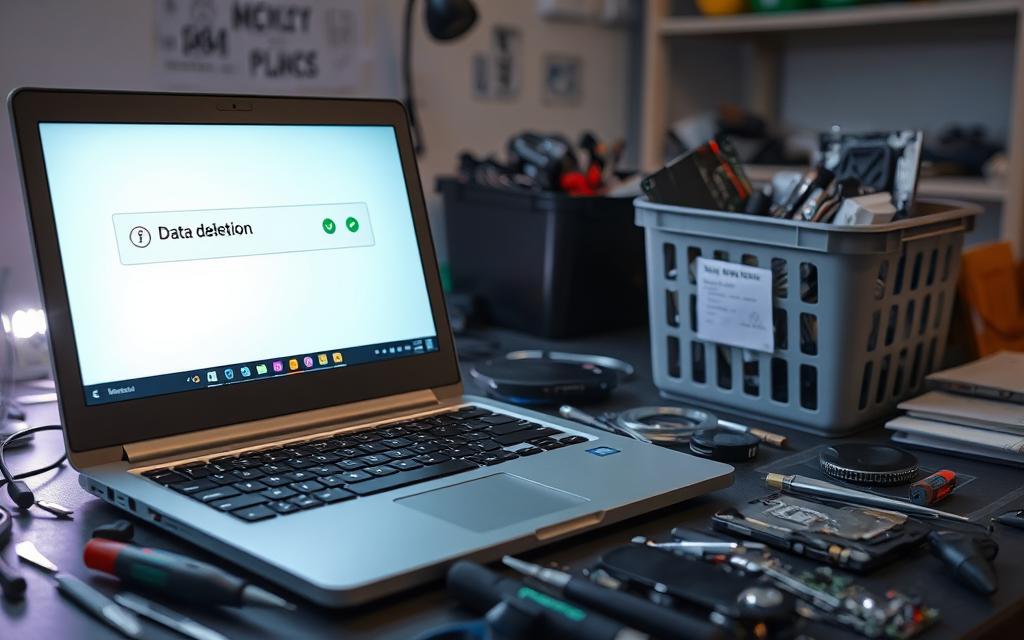
It’s very important to dispose of your laptop properly. Doing so keeps your private info safe and supports eco-friendly e-waste handling. By following these guidelines, you’ll be recycling your laptop responsibly.
Finding Responsible Recycling Options
Searching for reliable ways to recycle laptops is key for the environment and data safety. The growth of e-waste makes finding certified recycling methods vital. This stops the harm caused by incorrect disposal. Many guides provide tips on recycling the right way.
Identifying Certified E-waste Recyclers
To get rid of e-waste properly, choose certified recyclers. Being certified means they follow strict safety and eco rules. These facilities safely handle dangerous substances, reducing pollution. Organizations like ERI and Sims Recycling Solutions work in various places. They recycle ethically.
Understanding Manufacturer Recycling Programmes
Some manufacturers let you return used devices through their recycling programmes. For instance, Apple and Dell offer easy recycling. Apple gives up to $1,530 in gift cards for some products, through the GiveBack programme. Dell’s Reconnect, with Goodwill, accepts any computer brand. These schemes encourage right disposal and material reuse.
Benefits of Local Recycling Initiatives
Joining local recycling efforts has many pros. Your community might arrange collection days, making electronic recycling simpler. Cities often have special sites for dropping off electronics. These actions keep e-waste out of dumps and help local economies. Knowing about these options is good for our planet and keeps valuable metals usable.
| Manufacturer | Recycling Programme | Benefits |
|---|---|---|
| Apple | GiveBack | Up to $1,530 in gift cards |
| Dell | Reconnect with Goodwill | Any brand accepted |
| Best Buy | Electronics Recycling | Wide range of products |
| Sprint | Buyback Program | Account credits for any carrier |
Choosing these green recycling paths protects our data and the planet. Using certified e-waste recycling, manufacturer schemes, and local efforts helps manage electronic waste. It’s all part of keeping electronics out of the trash.
Post-Recycling Considerations
Recycling your laptop is a good first step. But what comes after is just as important. The world of electronic waste is changing fast. This means we need to keep learning and stay aware to avoid risks and make sure we recycle right in the future.
Monitoring for Possible Data Breaches
It’s crucial to watch out for your data after recycling your laptop. Post-recycling data monitoring is a must. Even if your laptop’s data seems gone, stay alert for any news of data breaches. Keeping tabs on your financial statements and credit reports can spot misuse early.
- Review financial accounts regularly for unusual transactions.
- Sign up for identity theft protection services.
- Stay informed about any data breaches involving companies you’ve previously engaged with.
Educating Yourself on Future Device Disposal
Learning about future electronic disposal education helps make smart choices for your next gadgets. It’s key to know how to safely erase your old devices and pick the right recycling options. Look for info on secure disposal and plan for your future electronics.
Also, teaching others about what you’ve learned is a good move. Talking about sustainable habits can build a culture of recycling awareness. That way, everyone knows how to dispose of gadgets safely and responsibly.
| Action | Importance |
|---|---|
| Monitor for Personal Data Breaches | Prevents identity theft and data misuse |
| Learn about Data Wiping Methods | Ensures sensitive information is permanently erased |
| Research Certified E-Waste Recyclers | Guarantees ethical recycling practices |
Conclusion
It’s really important to recycle laptops safely. Every year, we make a lot of electronic waste. This waste harms our planet and can be bad for our health. By recycling the right way, we keep our data safe. We also help the environment by not adding to landfills. Following rules like the RoHS and using certified recycling centres are key steps.
Also, the risk of losing your personal data can be scary. By saving important files and wiping data from devices properly, you won’t have to worry. It’s part of being smart and green with our tech. We all need to care more about how we use and dispose of our electronics.
Tech gets better fast, so we should keep our gadgets working longer. This means fixing them and not always buying new. It helps cut down on waste and uses resources wisely. Making smart choices and recycling our laptops safely makes a big difference. We can protect our planet and keep our digital lives safe at the same time.
FAQ
Why is safe laptop recycling important?
Recycling laptops safely is key to protect your private data and help our environment. It stops personal data leaks and reduces electronic waste. Doing this lessens the harmful effects of e-waste on Earth while keeping sensitive info secure.
What should I do before recycling my laptop?
First, make sure to back up your valuable data. You can use things like external drives or cloud services for storage. Then, it’s crucial to wipe your hard drive clean. This action stops anyone from getting your data later.
How can I securely delete my data?
To erase your data safely, use professional data wiping software that meets the highest standards. For extra caution, physically destroying the hard drive ensures your data is gone for good.
What are the signs of a trustworthy recycling option?
Trustworthy recyclers are usually certified and follow strict rules for both data safety and environmental protection. Look into recycling programs offered by manufacturers or local efforts. Pick ones with a good record of handling e-waste the right way.
What actions should I take after recycling my laptop?
Keep an eye on your accounts for signs of data misuse after recycling. Learning about the right disposal methods for future gadgets is also smart. It helps keep your information safe and supports environmental health.

